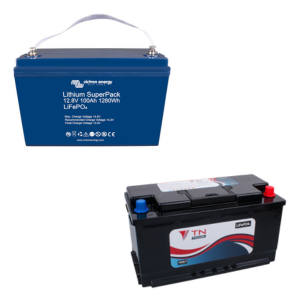Thinking Of Upgrading To Lithium Batteries?
Upgrading to lithium batteries can provide a wealth of benefits that make the investment well worth it for most consumers, in this article, we will outline some of those benefits.
Lithium batteries offer significantly higher energy density compared to traditional lead-acid batteries, meaning they can store more power in a smaller, lighter package. This translates to extended runtimes between charges, allowing users to go longer before needing to repower their devices or equipment. Lithium batteries also excel in their power delivery, capable of providing strong bursts of current to drive high-draw applications. Equally impressive is their superior lifespan - lithium batteries can typically be recharged thousands of times before wearing out, far outlasting the typical 300-500 charge cycles of lead-acid. This extended usable life helps offset the higher initial cost of lithium, as the batteries will continue functioning reliably for years to come. Beyond the core performance advantages, lithium batteries are also prized for their reduced maintenance requirements. They do not suffer from the same issues of sulfation and water loss that plague lead-acid, and do not need to be periodically discharged to avoid losing capacity. This hands-off operation is a major convenience, allowing lithium-powered devices to be used and stored with minimal hassle. With their winning combination of power, runtime, longevity, and ease of use, it's easy to see why upgrading to lithium batteries is an increasingly popular choice across a wide range of applications.
When considering an upgrade to lithium leisure batteries, there are several important factors to carefully weigh. Lithium-ion batteries offer a range of appealing benefits over traditional lead-acid and AGM options, including significantly lighter weight, faster charging times, and a longer overall lifespan. However, the upfront cost of lithium batteries is typically much higher, so the financial investment required can be a major barrier, especially for budget-conscious consumers. It's crucial to calculate the potential long-term savings from reduced maintenance and replacement costs to determine if the premium price is worthwhile for you in the long run. Lithium batteries also have different charging and discharging requirements compared to lead-acid, so upgrading may necessitate purchasing new chargers or modifying your existing setup, adding to the overall cost of the transition. If you have a split charge relay which current handles your battery to battery charging, this will definitely need changing for a DC-DC charger as they are not suitable for use with lithium batteries and it would definitely be worth looking at the other chargers in your system to evaluate their compatibility with lithium technology.
Additionally, lithium batteries are more sensitive to temperature extremes, both hot and cold, which can impact their performance and durability if not properly managed (some Lithium batteries have built-in heaters to combat this though). Thorough research is needed to ensure the lithium batteries you select are well-suited for your specific campervan, marine or other off-grid application and climate conditions. While the advantages of lithium are compelling, the higher upfront investment and specialized care requirements mean the decision to upgrade requires careful consideration of your needs, budget, and long-term goals in order to determine the most practical and cost-effective battery solution.
To summarise, the benefits of Lithium batteries over lead acid or AGM batteries are that they have a significantly longer life span, they are lighter in weight and allow you to use the full advertised Ah capacity and they are much less fussy in terms of their maintenance charging requirements. The main downside to Lithium batteries is that they are more expensive, so that rules them out for some consumers, but if you have the budget to stretch to Lithium, we would definitely recommend making the change.



Great article. It should be noted that for those thinking of upgrading for an overlanding vehicle, many shipping companies now prohibit carriage of vehicles with lithium batteries.